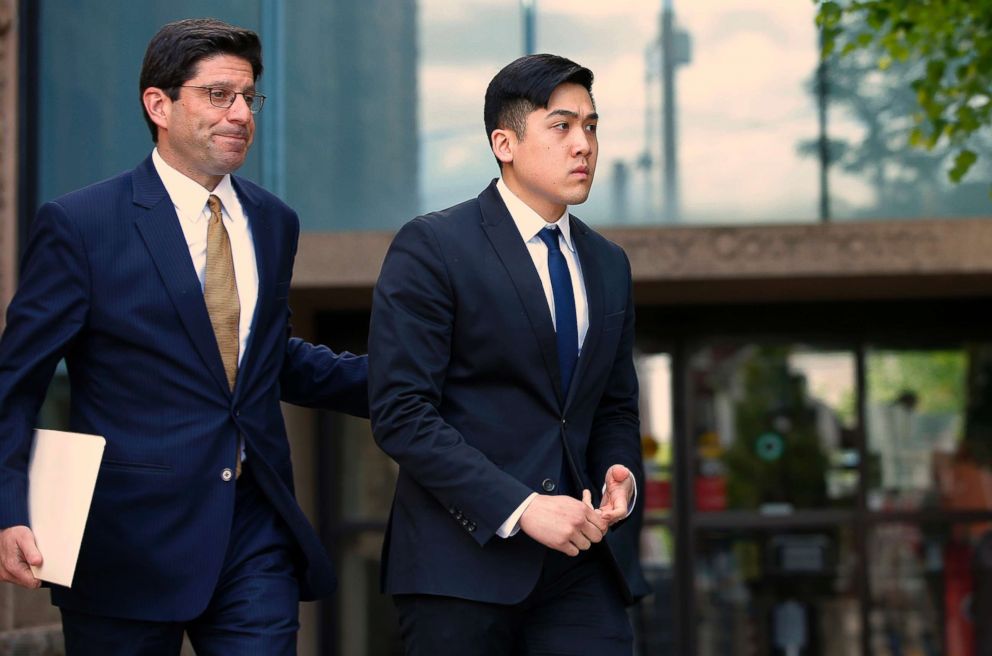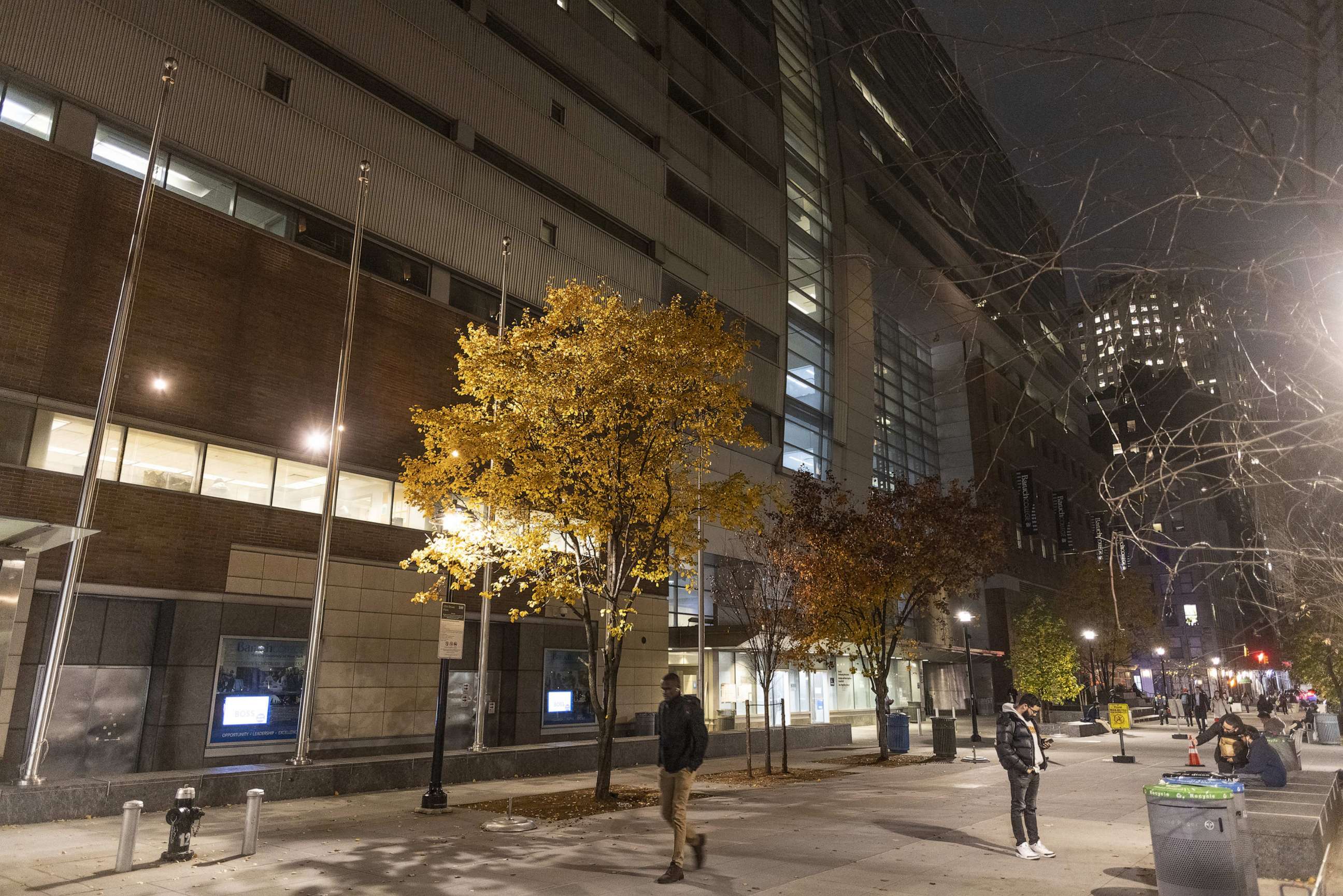The hazing death of Baruch fraternity pledge Michael Deng was 'an active cover up,' prosecutor says
Freshman Chun "Michael" Deng died in December 2013 from traumatic injuries.
Chun "Michael" Deng grew up in Queens, New York, as an only child in a first-generation immigrant family from China. The outgoing teenager excelled in academics and athletics and was very close to his family, said family attorney Doug Fierberg.
Deng decided to stay in New York City for college, enrolling at Baruch College, which is part of the City University of New York.
But on the morning of Dec. 8, 2013, as his first semester of freshman year drew to a close, his mother, Mary Deng, got the unexpected call that her son had been rushed to a Pennsylvania hospital with traumatic injuries.
The next day, Michael Deng was dead.

Unbeknownst to Mary Deng, her son was pledging the Asian-American fraternity Pi Delta Psi at Baruch.
Police said the 18-year-old died after a hazing ritual at a home the fraternity rented in Pennsylvania's Pocono Mountains. The shocking case helped expose the dangerous world of fraternity pledging and showed the major consequences fraternity members and fraternities themselves can face.
Watch the ABC News Studios six-part series, "Death in the Dorms," which chronicles the tragic stories of six college students whose lives were cut short by violent crime. The series is streaming exclusively on Hulu.
'An active cover up': Prosecutor
As Deng clung to life in the hospital on Dec. 8, 2013, police set out to determine how he got so seriously hurt, and spoke to the young men who brought him in.
Deng "did not have any sort of alcohol in his system, and the three young men who brought him did not seem to be under the influence," prosecutor Kimberly Metzger said. "However, these men were not providing the level of detail that one would expect you to have if your friend had suffered such a traumatic injury."
Police also set out to speak with the Baruch students who remained back at the Poconos rental house. Officers felt those students at the house were giving them "false narratives," Metzger said. Eventually, the students admitted they were all in the same fraternity.
"The fact that they just failed to mention that this was part of a fraternity ... was a big piece of information for them to just leave out innocently," she said.
An officer at the hospital confronted the three students who brought Deng in, saying he knew they were there for a fraternity gathering. One of those students reluctantly admitted "Michael was injured during a ritual called the glass ceiling," Metzger said.
In the frat's "glass ceiling" ritual, pledges, who are blindfolded and wearing a 30-pound backpack, must push "through a line of brothers while fraternity members shove" them and try to keep the "pledge from getting through the line," according to police.
Back at the rental house, some students had already left to go back to New York. But police said they determined the students who remained at the rental were omitting facts and avoiding answering questions about the fraternity.
"When individuals get seriously injured in hazing incidents, police face a wall of silence," Fierberg said. "Individuals are committed to their brotherhood."
After police searched the house, officials determined that the students "didn't just fail to give information," Metzger said. "This was an active cover up."
'He would've survived'
Police said Deng was tackled and knocked out during the "glass ceiling" ritual.
Metzger said the ritual unfolded like this: "The pledge, while blindfolded, will be told to call out for his big brother on the other side of a field. And as he called out, he would try to navigate forward. There would be other young men, other brothers, standing in [the pledge's] way. As that pledge made his way forward through that second tier, the physical contact would become more aggressive. Then, the pledge educator would indicate the beginning of the third tier of the glass ceiling -- the physical contact becomes much more severe."
"At one point, Michael is knocked to the ground so severely that he can't stand up on his own," she said.
Deng had been kicked in the head and his speech was slurred, according to police. But Deng was "told by members of the fraternity that he must continue forward," Metzger said.
Deng was then hit violently by fraternity member Kenny Kwan, who was the pledge assistant responsible for overseeing the ritual, according to police.

Deng became motionless, according to police. The fraternity members brought him inside, tried to wake him up and changed him out of his wet clothes, police said. Over 30 students were in the rental house at the time, officials said.
While Deng was unconscious, fraternity members contacted the national fraternity president, who allegedly told them to hide all fraternity-related items, according to authorities.
The fraternity members waited for more than an hour before driving Deng to a hospital 45 minutes away, police said.
On Dec. 9, 2013, one day after arriving at the hospital, Michael Deng died from traumatic injuries, according to a forensic pathologist, who said "the delay in treatment of one to two hours significantly contributed" to his death."
"There was approximately two hours of delay from the onset of the injury, when the individuals knew that Michael was in trouble, between then and when he ultimately got medical care. And we know that had he gotten timely medical care, he would've survived," Fierberg said.
Frat members head to court
Thirty-seven defendants were ultimately charged in the case, facing a range of charges, including aggravated assault and hazing.
"Everybody that lied to us during the course of the investigation, that was considered hindering apprehension," Pocono Mountain Regional Police Sgt. Lucas Bray explained.
Four fraternity members -- Charles Lai, Kenny Kwan, Raymond Lam and Sheldon Wong -- pleaded guilty to voluntary manslaughter and hindering apprehension, according to Reuters.Kwan was sentenced to 12 to 24 months in prison, Wong and Lam were sentenced to 10 to 24 months, and Lai was released on time served after 342 days in custody, Reuters reported.


Dozens of others pleaded guilty to lesser charges and were sentenced to probation, according to The Associated Press.
The Pi Delta Psi fraternity itself was convicted of charges including involuntary manslaughter and aggravated assault. It was acquitted of the more serious charges of third-degree murder and voluntary manslaughter.
Lai, who was Deng's "big brother" in the frat, "was in direct communication" with the fraternity's national president -- Andy Meng -- on the morning Deng was hospitalized, Metzger said. The national president allegedly told Lai and other members "to cover up and hide, and make sure that the national fraternity was not at all attached to this hazing event," Metzger said.

Andy Meng pleaded guilty to misdemeanor charges and was sentenced to 36 months of probation, according to Reuters.
The fraternity was banned from Pennsylvania for 10 years and was ordered to pay a fine of more than $110,000, according to The Associated Press. The 10-year ban was later overturned on appeal, so Pi Delta Psi is allowed to operate in Pennsylvania. The Deng family settled lawsuits against the national fraternity organization, the local fraternity chapter and five fraternity members, Fierberg said, though he would not discuss the terms of the settlement.
'Full of promise'
In the wake of Deng's death, Baruch said it issued a moratorium on pledging and rush activities for all of its social fraternities and sororities. The moratorium lasts through May 2024.
Baruch said in a statement that "Deng died needlessly" "as a result of a hazing ritual that occurred during an unsanctioned, secret, off-campus pledging event ... that violated college policies."

"Sadly, deaths and injuries as a result of hazing remains a national problem, and the ramifications are frequently devastating," Baruch said.
"Michael Deng should have never died," said Amanda Balazar, editor-in-chief of Baruch's newspaper, The Ticker. But "what came out of it was that Baruch got smart and they realized that these organizations were not healthy for our campus."
"It's horrifying that somebody like Michael ... would die in a ritual where he's trying to succeed," Fierberg said. "Michael was full of promise, full of pride for his family and full of life."




